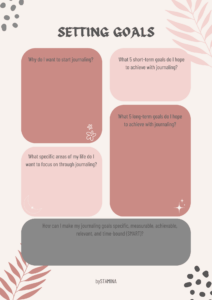At the start of your journey of keeping a journal, there is a lot of pressure, to not mess up. But what are the most common mistakes people make when writing their journals?
When I started to keep my journal, I was so anxious. When I was surfing the internet for some clues there was so much information about what I can or can’t do. I got confused, stressed and wondered how in the world I wouldn’t mess up.
If you are in a similar situation or are just looking at how you can improve your diary, don’t worry, I got you. When you read about the common mistakes people make when journaling, you will become extra prepared to write your diary like a pro, so there is no need for you to be anxious about messing up.
This post is all about the common crucial mistakes people make when keeping a journal.
Table of Contents
Toggle1. Setting Unrealistic Expectations for Journaling Success
This one is important. If I could show you my list I wrote about all the expectations I had when I started, you would laugh at me. Seriously, it was a page-long A4 format with ideas such as:
- I will keep track of my films and series.
- I will rate my books.
- I will track my mood and menstruation cycle.
- I will have a monthly calendar with obligations and a daily to-do list.
- I will keep quotes and songs I like and write about my feelings daily.
- I will include a page of random ideas.
- I will keep track of my fitness.
- I will write recepies.
My journal will have it all! Safe to say, most of the categories, that I created such beautiful entries for, were left empty.
In the beginning, it is important to start from your day-to-day life. What do you do daily, that you would like to keep track of? You can also ask yourself a question What area of life would I like to improve?
Then as you keep on going, you will figure out what sections work for you. Keeping a diary is a work-in-progress type of thing. The sections will change and grow with you, some will stay, and some will go. Therefore, setting expectations is deeply personal and a part of your self-discovery that follows your changing personality.
Goal setting
Goal setting is extremely important. On the day when you won’t feel like journaling your goals will be a source of motivation to keep going. Goals will also clarify the type of diary you would like to keep and guide you toward a direction tailored to your needs.
To help you, here are biopsychologist-approved questions to guide you through the goal-setting part of your journaling routine. Here you can also find self-discovery questions for creating personalised journal pages.
2. Focusing Exclusively on Negative Aspects
Of course, journaling is a place where you are allowed to be angry, sad, drown in self-pity and explain all the reasons why your life sucks. In fact, you definitely should do that!
But don’t forget about keeping a journal you love. That includes talking about your loves, grateful moments, hopes and dreams.
As much as the pages are a place to complain, a diary in its essence is a place to love your life.
- How wonderful it could be if the boss gave you a raise?
- What would you do with the money?
- How would it feel to go on a date with your crush?
- What would you do when you finally achieve that goal?
This is not just dreaming up the wonderland, it’s neuroscience. Writing about gratefulness and future positive expectations has been proven to shift our mindset, prompting us to seek manifestations of our desires in the present and affirm our dreams and wishes.
Simply put, when you expect good things to happen, they will!
3. Overcomplicating Journaling Processes and Techniques
I struggled with this for so long. Am I writing a gratefulness or a bullet journal? What about the structure? I found videos and blog posts and all the information just confused me and made me compare my style to others.
My advice to you; tailor your journal for your needs. It doesn’t need to fit into a category or follow the rules. It needs to shadow you and your goals. Remember, setting goals is extremely important, cause it is a setting stone for everything. It determines, what sections you will have, how often you will write, and what your focus is. It is a guide, that prevents you from getting lost, giving you a sense of direction.
Embracing individuality fosters a sense of ownership and empowerment in journaling practices, allowing for genuine self-discovery and growth. To help you set goals and find your voice use the free pdf above: A GUIDE TO SETTING GOALS AND JOURNAL PAGES.
4. Failing to Review and Reflect on Past Entries
If you want to truly master journaling then reflecting on your process is the key ingredient. This is a form of feedback, that tells you what works and what doesn’t. It will help you create a diary, that will suit your style.
Regular review and reflection are also essential components for effective journaling practice. Failing to revisit past journal entries hinders self-awareness and inhibits growth. Leveraging insights and patterns from previous entries informs future reflections and facilitates personal development in journaling endeavours.
You can find questions for reflection on my post:
Top 6 Journaling Basics: Your Roadmap to a Successful Journaling Routine.
Top 7 Journaling Basics: Your Roadmap to a Successful Journaling Routine








